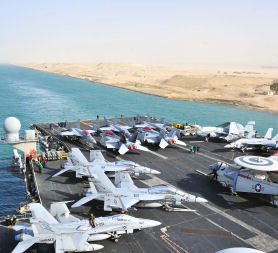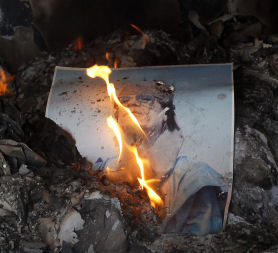West ready to use force against Libya’s Gaddafi
Western leaders including David Cameron are considering implementing a no-fly zone over Libya – but the former commander of British forces in Bosnia, now an MP, tells Channel 4 News he has concerns.

The Libyan leader continues to cling to power despite losing control of much of the east of his country, including the city Benghazi, which is now in the hands of anti-Government protesters.
After weeks of protests against his 41-year regime which have descended in many areas into pitched battles, the international community has also ramped up the pressure on Gaddafi, with leaders insisting he must go and considering a no-fly zone over Libya.
The United States has also said it is moving warships and aircraft, including the USS Enterprise (pictured) into the Mediterranean Sea near Libya.
We must not tolerate this regime using military force on civilians in Libya. David Cameron
There are warnings that the situation is descending into a humanitarian emergency, with thousands fleeing the violence – and increasing concerns that Gaddafi could carry out further attacks on his own people, orchestrated from his stronghold in the capital Tripoli, as his supporters dwindle and he loses control of more key assets and territory.
At least 1,000 people have already died in the fighting.
No-fly zone
Prime Minister David Cameron said the international community could not tolerate the use of military force on civilians in Libya.
“We do not in any way rule out the use of military assets. We must not tolerate this regime using military force against its own people,” he told MPs.
“In that context I have asked the Ministry of Defence and the Chief of the Defence Staff to work with our allies on plans for a military no-fly zone.”
'No-fly zones are never perfect'
"No fly zones are never perfect," Colonel Bob Stewart MP, who was the first British Commander under United Nations command in Bosnia - where a no-fly zone was implemented - during 1992-93, told Channel 4 News.
"I had a no-fly zone above me when operating on the ground and planes still fly, mistakes are made, and it can be dangerous."
He said that a no-fly zone over Libya would take a lot of co-operation - and may not work anyway.
"The Libyan people don't want military intervention. We'd have to get the UN to advocate it, get all the people who want it together - we can't do it alone. Our jets from Cyprus may not even make it without re-fuelling. And who would pay? We could have another Iraq or Afghanistan and a million people on the streets of London. It's a big operation. Why should we do it? We are not a great power. I hope we don't do it in a rush."

The Prime Minister also said most British citizens had now been evacuated from Libya. Their departure leaves him in a stronger position to put pressure on Gaddafi.
US Secretary of State Hillary Clinton also said a no-fly zone was being considered – which would prevent Gaddafi from using planes to fire on protesters. No-fly zones have previously been implemented in both Bosnia and Iraq.
Both the US and Britain are also understood to be considering arming the anti-Government forces to force Gaddafi out and the US has imposed an asset freeze on $30bn of assets owned by Gaddafi and his family.
Mr Cameron said: “If helping the opposition would somehow bring that about, it is certainly something we should be considering.”
Unreality in Tripoli
After three days in Tripoli, I feel as if I am living in a parallel universe; a world so odd that I have to kick myself to prove that yes, I really am here – and no, I am not imagining what I just heard, writes Channel 4 News Foreign Affairs Correspondent Jonathan Rugman.
While Messrs Obama and Cameron are telling Colonel Gaddafi to relinquish power and suggesting they will support those Libyans seeking to overthrow him, much of Libya's capital feels as if it is in a bubble of unreality, almost entirely disconnected from the regime's collapse elsewhere...
Read more on Libya: the unreal bubble of Tripoli
The US has also said it is moving warships and air forces closer to Libya as people living close to the Tunisian border in western Libya said that pro-Gaddafi forces were massing for an attack on Nalut in a bid to regain control. People in other key locations held by protesters – Misrata and Zawiyah – also said Government forces were either mounting or preparing attacks.
They love me, all my people love me. Colonel Gaddafi, in an interview with western journalists
In Tripoli, Gaddafi’s last stronghold, a number of people were killed when forces opened fire on protesters, according to the Quryna newspaper.
The UN has already condemned Colonel Gaddafi’s actions and imposed travel bans and asset freezes, but diplomats warned that a no-fly zone would be more complex to implement.
Gaddafi
In an interview with ABC News, the BBC and the Sunday Times last night, Gaddafi insisted his people still loved him and insisted that the protesters were not Libyan.
“They love me, all my people love me,” he said.
“They would die to protect me…this is al Qaeda, not my people. They come from outside.”
Read more: Channel 4 News Special Report on the Arab revolt
He also denied using the air forces to bomb protesters.
Speaking to Channel 4 News, his information minister Musa Ibrahim also denied that thousands of Libyans had been killed by Government forces.
He said: “We have in Tripoli more than 140 foreign correspondents who have been touring the city of Tripoli and the surrounding cities for days now. They have found no evidence of air bombardments of cities, no evidence of massacres and dead bodies in the streets.”